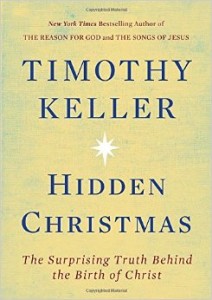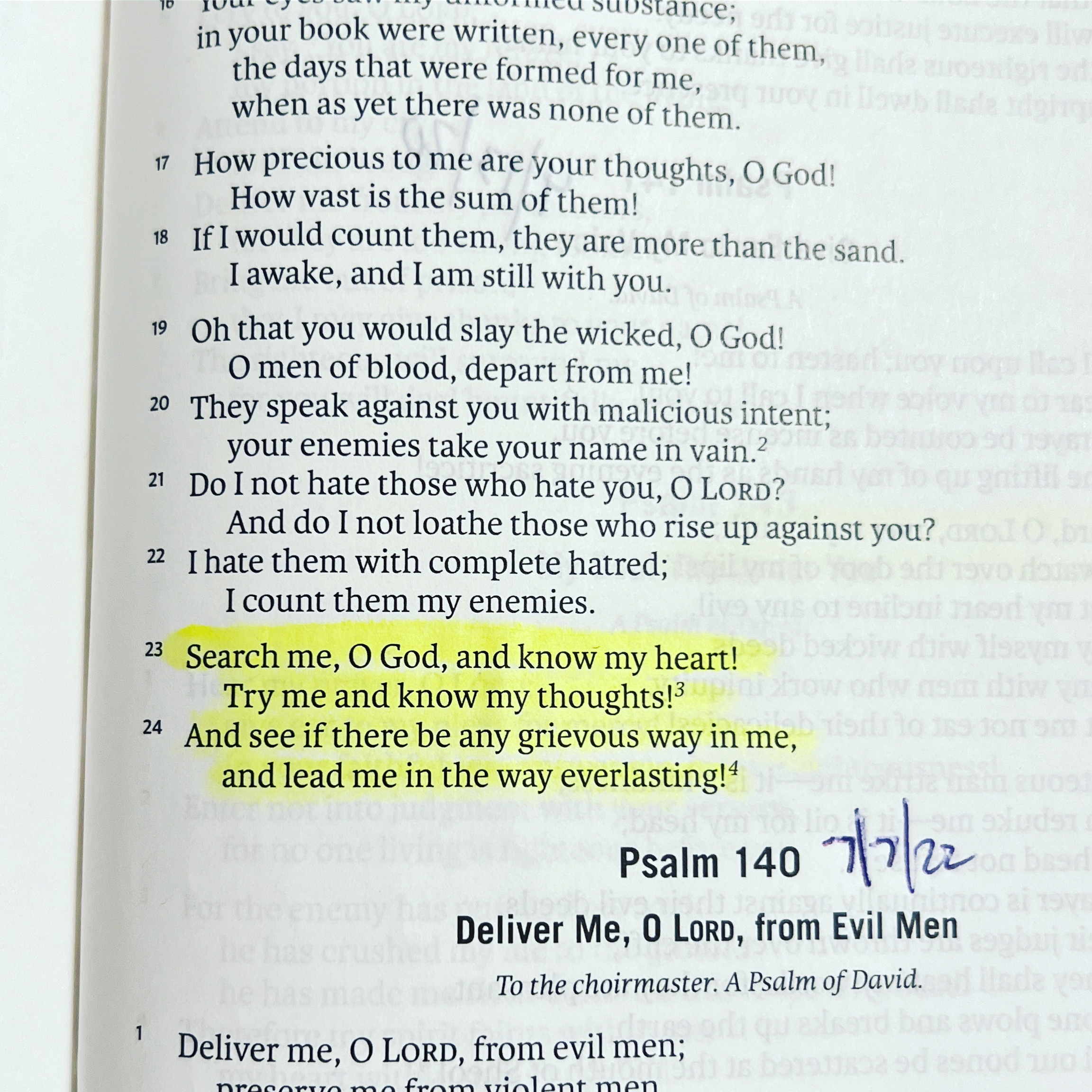Would you like to experience Christmas in a new and exciting way? Are you looking to recapture the wonder of this season? Do yourself a favor and pick up a copy of Hidden Christmas by Pastor Timothy Keller as a great resource to accompany your Advent study of God’s Word. This book can be a quick read or a deep study of the Scripture surrounding the birth of Christ. I finished the book last night and am filled with gratitude for a fresh perspective on Christmas and what it really means to have a loving God who sent part of himself to earth in the form of a baby in order to restore a right relationship with me. What a Savior! Prepare the way!
- That is, that the world is a dark place, and we will never find our way or see reality unless Jesus is our Light.
- Only through him does your reasoning capacity work, and only through his Word can you truly understand who he is and, therefore, who you are, his creation.
- When Jesus died on the cross, darkness fell over the land (Matthew 27:45). The Light of the world descended into darkness in order to bring us into God’s beautiful light (1 Peter 2:9). The promises of Christmas cannot be discerned unless you first admit you can’t save yourself or even know yourself without the light of his unmerited grace in your life. This is the foundational truth from which we can proceed to learn the hidden meanings of Christmas.
- Of course the Christian Gospel has massive implications for how you live. But it is first of all a message that you need to be saved, and you are saved not in the slightest by what you can do but rather by what he has done. You begin with Christ not by adopting an ethic nor by turning over a new leaf nor even by joining a community. No, you begin by believing the report about what has happened in history.
- Christmas shows us that Christianity is not good advice. It is good news.
- Jesus Christ is not one more lovely story pointing to these underlying realities—Jesus is the underlying reality to which all the stories point.
- The Gospel, because it is a true story, means all the best stories will be proved, in the ultimate sense, true.
- It is not the good people who are in and the bad people who are out. Everyone is in only by the grace of Jesus Christ. It is only what Jesus has done for you that can give you standing before God.
- If he is who he said he is, then you have to center your whole life on him. And if he is not who he said he is, then he is someone to hate or run away from. But no other response makes any sense. Either he is God or he isn’t—so he’s absolutely crazy or infinitely wonderful.
- The biblical God, however, is infinitely holy, so our sin could not be shrugged off. It had to be dealt with. He is also infinitely loving. He knows we could never climb up to him, so he has come down to us. God had to come himself and do what we couldn’t do. He doesn’t send someone; he doesn’t send a committee report or a preacher to tell you how to save yourself. He comes himself to fetch us. Christmas means, then, that for you and me there is all the hope in the world.
- My experience of fear and pain had given me a new power to comfort.
- Christianity says God has been all the places you have been; he has been in the darkness you are in now, and more. And, therefore, you can trust him; you can rely on him, because he knows and has the power to comfort, strengthen, and bring you through.
- If you want to be king, and someone else comes along saying he is the king, then one of you has to give in. Only one person can sit on an absolute throne. As we have seen, Jesus came to us claiming to be God, the King. He said, “If anyone comes to me and does not hate father and mother, wife and children, brothers and sisters—yes, even their own life—such a person cannot be my disciple” (Luke 14:26). This is not a command to literally become hateful toward one’s family. He is calling, rather, for an allegiance to him so supreme that it makes all other commitments look weak by comparison. It is a claim of absolute authority, a summons to unconditional loyalty, and it inevitably triggers deep resistance within the human heart.
- There is a natural enmity of the human heart against all claims of sovereignty over it. It rises up a little when minor claims are made over us. But Jesus’ claims of authority are ultimate and infinite. No heart, unaided, can gladly surrender to them.
- Another talk at that conference helped me do what I call the “theological grounding” for this kind of service to God. The woman who spoke said, “If the distance between the Earth and the sun—ninety-three million miles—was no more than the thickness of a sheet of paper, then the distance from the Earth to the nearest star would be a stack of papers seventy feet high; the diameter of the Milky Way would be a stack of paper over three hundred miles high. Keep in mind that there are more galaxies in the universe than we can number. There are more, it seems, than dust specks in the air or grains of sand on the seashores. Now, if Jesus Christ holds all this together with just a word of his power (Hebrews 1:3)—is he the kind of person you ask into your life to be your assistant?” That simple logic shattered my resistance to doing what Mary did. Yes, if he really is like that, how can I treat him as a consultant rather than as Supreme Lord?
- Becoming a Christian is not like signing up for a gym; it is not a “living well” program that will help you flourish and realize your potential. Christianity is not another vendor supplying spiritual services you engage as long as it meets your needs at a reasonable cost. Christian faith is not a negotiation but a surrender. It means to take your hands off your life.
- Therefore we do not lose heart. Though outwardly we are wasting away, yet inwardly we are being renewed day by day. For our light and momentary troubles are achieving for us an eternal glory that far outweighs them all. So we fix our eyes not on what is seen, but on what is unseen, since what is seen is temporary, but what is unseen is eternal. (2 Corinthians 4:16–18)
- Unlike Mary, we can read the vivid narratives, we can see Jesus being the Great Servant, surrendering his will, all for us. That enables us to say, “Lord, if you did this for me, then I can trust you and do this for you.” If she, a human being like all the rest of us, could do it without knowing yet about the cross, then we can do it too. Let us not fall lower in the test than Mary, this simple teenage girl. She points the way for us.
- Christmas means that, through the grace of God and the incarnation, peace with God is available; and if you make peace with God, then you can go out and make peace with everybody else. And the more people who embrace the Gospel and do that, the better off the world is. Christmas, therefore, means the increase of peace—both with God and between people—across the face of the world.
- If you take time to comprehend (behold) what is in the Gospel message, it will remove the fear that has dominated and darkened your life. To the degree you truly behold—gaze at, grasp, relish, internalize, rejoice in—the Gospel, to that degree the fears of your life will be undermined.
- God did not merely write us “information” about himself; he wrote himself into the drama of history. He came into our world as Jesus Christ to save us, to die for us. Look! Won’t you trust somebody who did all that for you? The angel is saying: “You want relief from all your fear? Behold! Look at Christmas. Look at what he did.” And to the degree you behold it, and grasp it, and treasure and ponder it in your heart, to that degree those fears will start to diminish. Fear not! Behold!
- You don’t have to be Jesus Christ to get people furious at being exposed for what they are. Just living an honest, moral life will expose gossip in the office, corruption in government, racism in the neighborhood. The manger at Christmas means that, if you live like Jesus, there won’t be room for you in a lot of inns.
- The coming of Jesus into our lives makes us peacemakers, yet it also brings conflict. If you are a committed Christian, then, you will know both the triumphs of peacemaking and the heartbreak of opposition. Christians often feel like the psalmist when he wrote: “I am for peace; but when I speak, they are for war” (Psalm 120:7).
- If you want to know God personally, you cannot just believe general truths about him or say your prayers to him. You must immerse yourself in the Gospel texts. When you read the Gospels, you are seeing God in human form. We see God’s perfections in ways that we can relate to. We see his love, his humility, his brilliance, his wisdom, and his compassion. But they are no longer abstractions. We see them in all their breathtaking, real-life forms. You can know the glories of God from the Old Testament, so overwhelming and daunting, but in Jesus Christ they come near. He becomes graspable, palpable. He becomes above all personal, someone with whom to have a relationship.
- Don’t be put off by the ordinariness of the means of joy, for in that ordinariness is hidden the extraordinary riches of the Gospel.


